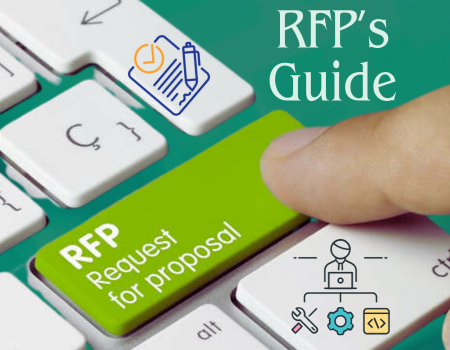Fundamentals of Writing Effective RFPs: The Ultimate RFP’s Guide
Speaker: Kenneth Jones
Speaker Designation: Procurement Specialist

Speaker: Kenneth Jones
Speaker Designation: Procurement Specialist

Writing an RFP is a valuable skill for any professional. Indeed, when done correctly, the RFP process allows you to select the best vendor while also ensuring competitive pricing and reducing risk. RFPs have a long history in business and are widely used. As a result, understanding the RFP process and best practices is critical for success. A good RFP is as concise as possible while providing useful contextual information to vendors and asking the appropriate questions. It can be difficult to strike the right balance.
Even seasoned professional Procurement staff dread doing RFP’s and many office staff who are called on by their supervisors to do one are not sure where to start. Because RFP’s maybe an infrequent experience it is always great to attend a webinar to sharpen your skills and avoid the risks of having the RFP process be unsuccessful. Anyone involved in the drafting or scoring of an RFP as well as those that may need to respond to one will complete this webinar with an improved sense of confidence in tackling this procurement method.
This webinar will discuss in detail the definition of a request for proposal when to use it, how to draft it, and more. It will provide a better understanding of how contracts are created after an RFP process is completed. You’ll learn how to craft a Request for Proposal (RFP) with confidence. Contractors will gain insight into how to ask the right questions and what is involved in getting an award through the RFP process.
Well-crafted RFPs are highly personalized, clear, concise, and thoughtful. As a result, high-quality proposals are frequently submitted in response to these RFPs. However, some RFP red flags may indicate to your vendors that the project isn't worth their time. Poorly written RFPs yield low-quality proposals. Worse, there are too few proposals to make an informed decision.
Gain valuable tips and learn how to get the most from your request for the proposal process.
Receive the benefit of training from an experienced procurement professional who has personally issued various successful requests for proposals (RFPs) over a 30-year career with the government and nonprofit sector. Be informed as to when an RFP is the proper procurement instrument to use, how to work with a department and/or scoring committee to make an appropriate award, and how to avoid pitfalls in the RFP process. This material will also discuss how to draft a successful RFP document, a scoring matrix that will assist in getting the best quality vendor, and a contract resulting from the RFP award.
Any person assigned to do a Request for Proposal (RFP) or be on a scoring team should attend this webinar to have the skills to get the best possible results.
In this practical webinar, you’ll receive instruction on how to create RFP’s and scoring matrixes and how to avoid common pitfalls.
You will learn:-
• When Is It Best to Do a Bid or Quote?
• Should a Request for Information (RFI) Be Issued First?
• Developing an RFI
• Key Sections to Be Included
• Mandatory Requirements
• Preferred or Scored Technical Criteria
• Vendor Submittals
• Weighted Criteria
• Method of Award
• General Terms and Conditions
• Procurement Schedule and Contacts
• Pricing Pages
• Must Be Drafted With the RFP Document
• What Criteria Can Be Scored?
• How to Structure the Scored Questions
• Are References Being Scored?
• How to Develop a Reference Questionnaire Scoring Sheet
• Getting the Vendor Response You Are Looking For
• Avoiding Scoring Problems
• Rejecting Proposals
• Debriefing Vendors
• Vendor Responsibility Review
• Terms to Include to Prevent Problems
RFP stands for "Request for Proposals." It is a formal document that organizations use to solicit proposals from potential vendors or service providers. Organizations use RFPs to ensure a fair and competitive process for selecting vendors. Vendors, in turn, respond to RFPs by submitting detailed proposals that outline how they plan to meet the organization's requirements and objectives. The organization then evaluates these proposals based on the predetermined criteria and selects the vendor that best meets its needs.
In the realm of procurement and vendor selection, Request for Proposals (RFPs) serve as a linchpin, acting as a bridge between organizations and potential vendors. The process of writing an effective RFP is a strategic undertaking that requires precision, clarity, and a deep understanding of organizational needs. By mastering the fundamentals of writing effective RFPs, professionals can elevate their procurement processes, attract high-quality vendor proposals, and make informed decisions that align with organizational goals.

Ken Jones has been working in the public and non-profit procurement field for 30 years. He worked for the New York State Office of Taxation and Finance as a Purchasing Assistant from 1985-87 and left there to work for the University at Albany, SUNY where he served as a Purchasing Agent and in 1999 was the Assistant Director supervising and providing training for the Office of Purchasing and Contracts. This included proving training for both State procurement and The Research Foundation for SUNY procurement rules and regulations. His previous purchasing experience included procuring commodities, services, and construction for the departments on campus. A past Director of the SUNY Purchasing Association, Ken retired from the position of Assistant Director in January of 2014. However, he was requested to continue to assist the office through the end of 2014 and is again doing so. Until 2020, Ken worked part-time for the SUNY Center for International Development as a Procurement Specialist assisting primarily with training and reviewing the work of procurement staff in Nairobi, Kenya with the AHADI program in Kenya, Africa. Ken has trained many University staff on procurement rules and regulations. He established online ordering processes with vendors ranging from Office supplies to Lab chemicals and continues to provide training in his current position. Ken has presented on various procurement topics both in person and on the Web.